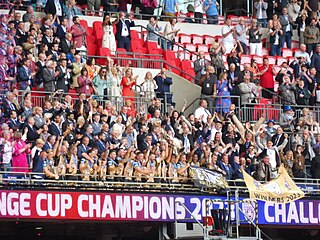
Winning All Four Cups referred to winning all four competitions available to a British rugby league side in the top division between 1907 and 1970. The cups available to win were the First Division Championship, Challenge Cup, county league and county cup. The feat was achieved on three occasions.

The Halifax Panthers are a professional rugby league club in Halifax, West Yorkshire, England. They play home games at The Shay and compete in the Championship, the second tier of British rugby league.

Rugby league is played across England but is most popular in Northern England, especially Yorkshire and Lancashire where the game originated. These areas are the heartland of rugby league. The sport is also popular in Cumbria where the amateur game is particularly powerful.
The British rugby league system is based on a five-tier structure administered by the Rugby Football League.
Kelvin Skerrett is an English former professional rugby league footballer who played in the 1980s and 1990s, and coached in the 2000s. He played at representative level for Great Britain and Wales, and at club level for Hunslet, Bradford Northern, Western Suburbs Magpies, Wigan and the Halifax Blue Sox, as prop or second-row, and coached at club level for Oulton Raiders ARLFC, and Methley Royals ARLFC.
Alan Hardisty, also known by the nickname of "Chuck", is an English former professional rugby league footballer who played in the 1950s, 1960s and 1970s, and coached in the 1970s and 1980s. He played at representative level for Great Britain and Yorkshire, and at club level for Castleford (captain) and Leeds (captain) as a stand-off, and coached at club level for Castleford and York.
The 1901–02 Northern Rugby Football Union season was the seventh season of rugby league football run by England's Northern Rugby Football Union. A number of off-season changes made this season different from preceding ones. In June 1901 fourteen leading clubs from both Lancashire and Yorkshire resigned from their respective County Championships to form a new Northern Rugby Football League.
The 1958–59 Northern Rugby Football League season was the 64th season of rugby league football. Thirty clubs from across Northern England competed for the Championship, culminating in a final between St. Helens and Hunslet.
The 1962–63 Northern Rugby Football League season was the 68th season of rugby league football.
The 1969–70 Northern Rugby Football League season was the 75th season of rugby league football in Britain.
The 1976–77 Northern Rugby Football League season was the 82nd season of rugby league football. Sixteen English clubs competed for the Championship, with Featherstone Rovers claiming the title.
The 1987–88 Rugby Football League season was the 93rd season of rugby league football in Britain.

Rugby league is played across England, Ireland, Scotland and Wales, but its heartland in parts of Northern England is where the sport is most popular, and is where the majority of professional clubs are based. The sport was first established in the George Hotel, Huddersfield, where 22 clubs split from the Rugby Football Union to form the Northern Rugby Football Union.
The 1940–41 Northern Rugby Football Union season was the second season of the English rugby league’s Wartime Emergency League necessitated by the Second World War. After doubts that the season might not start, matches were played in a league organised in a similar way to the previous season with two regional leagues, Yorkshire and Lancashire, with the winners of each league meeting in a two-legged play-off final to determine the overall champions.
The 1941–42 Northern Rugby Football Union season was the third season of the rugby league’s Wartime Emergency League necessitated by the Second World War. With fewer clubs than the previous season the Rugby Football League (RFL) decided to amalgamate the two county leagues into one joint league. The season started with 18 clubs but finished with 17 after Broughton Rangers withdrew in January 1942. The single division championship was won by Dewsbury, who had finished the season in first position and then defeated Bradford Northern in the play-off final.
Runcorn FC was a rugby league club. Having formed in 1876 and played rugby union as members of the RFU, they joined the Northern Union in 1895, just several days after it was founded, and played in the league from 1895–96 to 1917–18.
The 1941–42 Yorkshire Cup was the thirty-fourth occasion on which the Yorkshire Cup competition had been held. Organised by the Rugby Football League (RFL), the Yorkshire Cup was a knock-out competition between the professional rugby league clubs from the county of Yorkshire. Under the wartime emergency rules the RFL was operating to, teams from Lancashire were invited to participate as the Lancashire Cup was not played. The Cup was played for by 14 teams from Yorkshire and two from Lancashire.
Rugby League in Lancashire refers to the sport of rugby league in relation to its participation and history within the traditional county of Lancashire, England. The county has since been split up for administrative purposes with parts of traditional Lancashire forming parts of Greater Manchester, Merseyside, Cheshire and Cumbria as well as the current borders of Lancashire.
The RFL Lancashire Cup, usually referred to as the Lancashire Cup, was a British rugby league football knock-out competition founded in 1905. Organised by the Rugby Football League (RFL), the competition was open to all professional clubs in the Lancashire region, but also included a number of clubs based in Cumbria.
The County Championship was a representative competition of British counties in rugby league between 1895 and 1983.



